ACA

MATTHEW DESMOND, a Princeton sociologist and author, has grown tired of calls to reduce poverty — because he knows we can abolish it. In his new book, Poverty, by America, Desmond explores not the lives and struggles of people who are poor — but poverty, and the conditions that cause it. And Desmond contends that the lives the rest of us live are often connected to the conditions that cause poverty.
“To understand the causes of poverty, we must look beyond the poor. Those of us living lives of privilege and plenty must examine ourselves,” Desmond writes. “Are we — we the secure, the insured, the housed, the college educated, the protected, the lucky — connected to all this needless suffering?”
Desmond is the son of a pastor, and his work is rich with spiritual metaphor and flare while grounded in the material realities of poverty and the conditions that cause it. He dedicates a chapter of his book to refuting the idea that “neoliberal” cuts in welfare spending are to blame for poverty. “There is no evidence that the United States has become stingier over time. The opposite is true,” he writes. Instead, the problem is “a fair amount of government aid earmarked for the poor never reaches them.” Sojo.net associate news editor Mitchell Atencio spoke with Desmond about his new book, community building, and capitalism. —The Editors
Sojourners: Theologian Gustavo Gutiérrez defines poverty as “premature and unjust death,” saying that “the poor person is someone who is treated as a non-person, someone who is considered insignificant from an economic, political, and cultural point of view.” Is that a good way to describe poverty?
Matthew Desmond: I think that’s a factual way to describe what poverty is. Between 2001 and 2014, the richest women in America gained three years of life and the poorest women gained 15 days. So, poverty is death. There was a study that came out very recently that showed that one of the leading causes of death in the United States is poverty. I think that when we deny people access to basic needs, and we deny them basic economic security in this rich land, we do deny them life and happiness itself.
The other part of the quote about insignificance is very interesting because it does seem that in our popular culture — our TV shows, our movies, our children’s books — there are often no portrayals of real poverty in those media, and so it’s kind of amazing how seamlessly the poor can be erased from everything we’re reading and watching and reading to our kids.

I AM A FAMILY PHYSICIAN in Cleveland. For more than two decades, I have cared for lower-income families whose health struggles were made worse by their inability to afford private health insurance or to qualify for publicly funded health insurance through Medicaid or Medicare. Very few of their employers offer health insurance. This results in unaffordable medications and treatments, poor control of chronic illnesses, and avoidable complications from these illnesses.
The Affordable Care Act (ACA) of 2010 represented a sea change in the lives of my patients. They benefitted from two major health-insurance expansions: individual health-insurance exchanges, with subsidies to help middle-income families buy private insurance, and an expansion of Medicaid.

The rules, a direct rollback of the ACA’s contraceptive coverage mandate requiring access to birth control without additional cost, are considered a fulfillment of a promise Trump made to the religious community at a speech in the Rose Garden five months earlier, stating, "We will not allow people of faith to be targeted, bullied, or silenced anymore." But one of his biggest opponents is an evangelical Christian.

The Graham-Cassidy-Heller-Johnson ACA repeal bill is the most radical and most disruptive plan to reorder one-sixth of the U.S. economy, in no small part due to the rush to pass something, anything that would fulfill the 7-year Republican promise to “repeal and replace Obamacare” ahead of a critical Sept. 30 deadline this Saturday. On Oct. 1 a new fiscal year starts for the U.S. government, forcing the GOP to start over with the complex budget maneuvering that allows them to pass a bill with only 50 votes in the Senate rather than the 60 that are generally required.
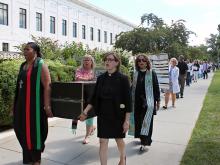
For the third week in a row, clergy showed up on Capitol Hill to protest Senate action on health care.
As in past weeks, some were arrested. But on this Tuesday, the group ratcheted up the drama by marching to the Capitol, carrying a cardboard coffin and poster-sized death certificates for those who would lose health insurance.
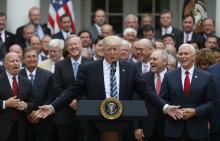
President Donald Trump pleaded with Senate Republicans on Monday to "do the right thing" on health care and allow debate to begin on a measure to repeal and replace Obamacare. The Senate is expected to vote on Tuesday on whether to begin debating a health care overhaul, although Senate Majority Leader Mitch McConnell (R-Ky.) has not specified which version of the bill the senators will vote on.
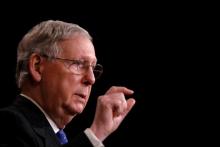
In the United States, the latest setback delivered a major political blow to Trump, who has failed to win any major legislative initiative in the first six months of his presidency.

Editor's Note: On June 21, the day before Senate Republicans released the text of their health care plan, Rep. Joe Kennedy (D-Mass.) spoke at The Summit, Sojourners' annual gathering of faith and justice leaders, about the Christian call to recognize the inherent human dignity in those who would be most affected by drastic health care cuts. At the link is the full text of his remarks, as prepared for delivery.
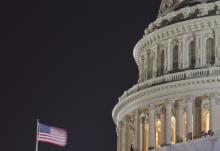
In a series of floor motions, inquiries and lengthy speeches, Democrats criticized the closed-door meetings that Republicans have been holding to craft a replacement for Obamacare, formally known as the Affordable Care Act. They called for open committee hearings and more time to consider the bill before a Senate vote, which Republicans say could come in the next two weeks, although a draft bill has yet to emerge publicly.
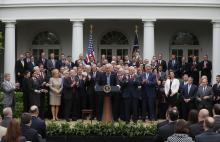
President Donald Trump had a party yesterday in the White House Rose Garden — while cases of beer were wheeled into the Capitol Building — to celebrate the just-passed Republican health care bill through the House of Representatives. If this bill passes the Senate and is signed by President Trump, the core elements of the bill will create conditions in which 24 million fewer people will have health insurance by 2026 than under the Affordable Care Act, which is, for the time being, still the law of the land.

Overall, states would be forced to absorb $880 billion in Medicaid cuts to prevent the reduction or elimination of Medicaid services, something states are in no position to do according to governors from both parties. The bill would cut almost $900 billion from Medicaid over ten years, mostly to pay for changes that would benefit high-income people and corporations.
And in a morally shocking move, it is not just the poor, but the older and sicker poor people who will fare the worst under the new law.
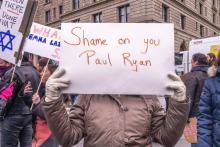
Almost immediately after House Republicans unveiled the health care plan they hope will replace the Affordable Care Act, a number of Bible-quoting, justice-loving Christians began pointing out that the GOP's proposed replacement doesn't quite live up to Jesus's command to "heal the sick."
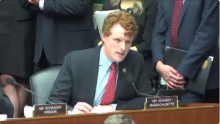
During Wednesday night's heated debate over the GOP's proposed replacement to the Affordable Care Act — which ultimately passed the House Ways and Means Committee early Thursday morning — Rep. Joe Kennedy III (D-Mass.) quoted Matthew 25 to rebuke Speaker Paul Ryan's description of the measure as "an act of mercy."
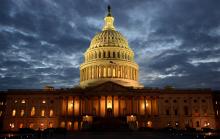
The U.S. Senate voted 51 to 48 in the early hours of Jan. 12 to begin the process of repealing major portions of the Affordable Care Act, also known as Obamacare. The vote went on for seven hours, as Senate Democrats attempted to build on growing unease among House and Senate Republicans over repealing major provisions of the ACA without a repeal in place. Ultimately, only Sen. Rand Paul (R-Ky.) joined the Democrats in voting against, and the resolution was approved.
Last night’s hours-long late night vote is known as a “vote-a-rama,” a long series of back-to-back votes in the Senate. Though atypical, it’s become a more common practice for major votes in the Senate.

I sat on the first wooden pew of the Metropolitan AME Church in Washington, D.C., on New Year’s Eve, with 500 faithful from across the country and thousands who watched online, to worship, testify, and encourage each other.
We came together in the tradition of the 1862 “watch night” service, when enslaved and free African-Americans, abolitionists, and others awaited news that the Emancipation Proclamation would become law and would free black people living in the South. We came together also in the tradition of Jesus, who told his disciples to “keep awake” while he prayed on the night before his crucifixion.

IN OAKLAND, CALIF., schools and other nontraditional sites host health clinics that provide both primary care and preventive health services for area residents, many of whom are uninsured.
In south Los Angeles, mental health professionals have created programs based on nutrition and group exercise, along with peer-to-peer education about the transmission of HIV/AIDS. Community groups, faith-based organizations, schools, and health providers are coming together in Albuquerque, N.M., to enroll hundreds of children in Medicaid and start neighborhood walking groups—part of an effort to break down walls between health-care providers and their patients
The U.S. health-care system is known for treating advanced-stage illnesses with expensive therapies that are often not accessible to those without health insurance. So if these low-cost, preventative programs in Oakland, LA, and Albuquerque don’t sound like the typical U.S. approach to health, you’re right: These and other community-based efforts trace their inspiration to the remarkably successful health system built by the nation of Cuba.

THE AFFORDABLE CARE ACT, which has now been the law of the land for five years, is beginning to reshape the national landscape in significant ways.
According to a New York Times analysis of the ACA’s first enrollment period, about 10 million additional people gained insurance in 2014. Many of them fall into demographic groups that have historically struggled to access coverage, such as low-income Americans, people of color, and women. Ultimately, President Obama’s health law is slowly making the country more equal.
There are a few ways the ACA is accomplishing that goal. It has built-in consumer protections to ensure that insurance companies treat people more fairly. It’s created state-level marketplaces to give people new options for purchasing private plans. And it’s expanded the pool of people who are eligible for public coverage through the Medicaid program.
Health policy experts agree that adding more low-income people to the Medicaid rolls represents one of the biggest successes of the ACA so far. According to the Urban Institute, a nonprofit research group, the states that agreed to expand their Medicaid programs—27 so far, plus the District of Columbia—have seen about a 40 percent drop in their uninsured rates.


The Supreme Court on Monday sided with the evangelical owners of Hobby Lobby Stores Inc., ruling 5-4 that the arts-and-crafts chain does not have to offer insurance for types of birth control that conflict with company owners’ religious beliefs.
Beyond the specifics of the Hobby Lobby case before them, the justices broke new legal ground by affirming that corporations, not just individual Americans or religious non-profits, may claim religious rights.
Does Monday’s decision mean, however, that the religious beliefs of business owners stand paramount? That they are more important than a female employee’s right to choose from the full array of birth control methods she is promised under the Affordable Care Act? Or that a business owner may invoke his religious rights to deny service to a gay couple?
Not necessarily, legal experts say.
